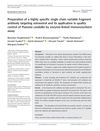 10 citations,
September 2020 in “Metabolites”
10 citations,
September 2020 in “Metabolites” Hair color and length affect metabolite profiles in hair, so they should be considered in hair analysis.
 17 citations,
April 2015 in “Tropical Journal of Pharmaceutical Research”
17 citations,
April 2015 in “Tropical Journal of Pharmaceutical Research” Asiasari Radix et Rhizoma is safe and has potential for new drug development due to its therapeutic properties.
 July 2024 in “Journal of Investigative Dermatology”
July 2024 in “Journal of Investigative Dermatology” Losing both ERBB2 and ERBB3 receptors in mice causes significant skin problems and inflammation.
45 citations,
August 2018 in “Journal of Lipid Research” Blocking the ATX-LPA pathway may improve insulin sensitivity and mitochondrial function in obesity.
 47 citations,
June 2019 in “Nature Communications”
47 citations,
June 2019 in “Nature Communications” Noncoding dsRNA boosts hair growth by activating TLR3 and increasing retinoic acid.

New insights into cell communication in psoriasis suggest innovative drug treatments.
 12 citations,
January 2013 in “Alcohol and Alcoholism”
12 citations,
January 2013 in “Alcohol and Alcoholism” Alcohol in teen years leads to more adult drinking, finasteride doesn't help.
 5 citations,
January 2023 in “Cell proliferation”
5 citations,
January 2023 in “Cell proliferation” Chick embryo extract helps rat hair follicle stem cells potentially turn into Schwann cells, important for the nervous system.
 88 citations,
January 2019 in “Journal of Tissue Engineering and Regenerative Medicine”
88 citations,
January 2019 in “Journal of Tissue Engineering and Regenerative Medicine” Conditioned media from mesenchymal stem cell cultures could be a more effective alternative for regenerative therapies, but more research is needed.
 109 citations,
October 2007 in “Journal of pineal research”
109 citations,
October 2007 in “Journal of pineal research” Melatonin helps regulate hair growth and protects the hair follicle from stress.
 20 citations,
April 2021 in “Journal of Womens Health”
20 citations,
April 2021 in “Journal of Womens Health” Testosterone can help premenopausal and postmenopausal women with low sexual desire, but its long-term safety is unclear and it's not widely approved for this use.
 60 citations,
December 1998 in “Clinical Pharmacology & Therapeutics”
60 citations,
December 1998 in “Clinical Pharmacology & Therapeutics” Both drugs lower DHT levels, with GI198745 being more effective.
 4 citations,
February 2022 in “Frontiers in molecular biosciences”
4 citations,
February 2022 in “Frontiers in molecular biosciences” Chronic stress in mice changes skin metabolism and gene expression, leading to hair loss.
 1 citations,
April 2023 in “bioRxiv (Cold Spring Harbor Laboratory)”
1 citations,
April 2023 in “bioRxiv (Cold Spring Harbor Laboratory)” Climate-related nutritional stress may cause hair loss in juvenile male Guadalupe fur seals.
 49 citations,
February 2019 in “The Journal of Clinical Endocrinology and Metabolism”
49 citations,
February 2019 in “The Journal of Clinical Endocrinology and Metabolism” Use "female pattern hair loss" term, assess androgen excess, treat with minoxidil and other medications if needed.
 18 citations,
December 2021 in “Foods”
18 citations,
December 2021 in “Foods” Seaweeds contain beneficial compounds with potential uses in food, cosmetics, and health, but more research is needed to improve extraction and safety.
 37 citations,
January 2015 in “Evidence-based Complementary and Alternative Medicine”
37 citations,
January 2015 in “Evidence-based Complementary and Alternative Medicine” An extract from Quercus acutissima bark was found to reduce sebum production and block an enzyme linked to acne.
 16 citations,
October 2015 in “Photochemistry and photobiology”
16 citations,
October 2015 in “Photochemistry and photobiology” Reducing copper (II) ion levels in hair can decrease hair damage.
 January 2024 in “bioRxiv (Cold Spring Harbor Laboratory)”
January 2024 in “bioRxiv (Cold Spring Harbor Laboratory)” A specific enzyme is essential for proper hair follicle stem cell development and healthy skin.
 5 citations,
April 2019 in “Phytochemical Analysis”
5 citations,
April 2019 in “Phytochemical Analysis” The new ELISA method is reliable and eco-friendly for checking the quality of Pueraria candollei.
 93 citations,
January 1996 in “Clinical Pharmacokinectics”
93 citations,
January 1996 in “Clinical Pharmacokinectics” Finasteride helps regrow hair and shrink prostate by reducing DHT, with some sexual side effects.
21 citations,
March 2018 in “American Journal Of Pathology” Mutations in NIPAL4 cause skin issues by disrupting lipid layers, but some improvement is seen with topical treatment.
 May 2024 in “BMC veterinary research”
May 2024 in “BMC veterinary research” Metabolites and diet affect hair growth cycles in cashmere goats.
 42 citations,
November 2019 in “Frontiers in Endocrinology”
42 citations,
November 2019 in “Frontiers in Endocrinology” The document suggests creating a validated score to diagnose Cushing's Syndrome and considers plasma steroid profiling as a simpler diagnostic method.
 125 citations,
May 2019 in “Phytomedicine”
125 citations,
May 2019 in “Phytomedicine” Cepharanthine is a well-tolerated drug with multiple medical uses, including anti-inflammatory and anti-cancer properties.
2 citations,
February 2023 in “International journal of molecular sciences” Tetrathiomolybdate reduces hair growth marker in skin cells by boosting harmful oxygen molecules, but effects can be reversed.
 6 citations,
April 2022 in “Frontiers in cell and developmental biology”
6 citations,
April 2022 in “Frontiers in cell and developmental biology” The research identified key proteins and genes that may influence wool bending in goats.
 January 2025 in “bioRxiv (Cold Spring Harbor Laboratory)”
January 2025 in “bioRxiv (Cold Spring Harbor Laboratory)” Rhamnose may help hair growth and pigmentation, making it a potential treatment for hair loss.
2 citations,
June 2023 in “Current Nutrition & Food Science” Hinokiflavone may help treat cancers and other health issues.
1 citations,
October 2023 in “Journal of personalized medicine” Food intake, not genetics, affects how the body processes tadalafil and finasteride.

























